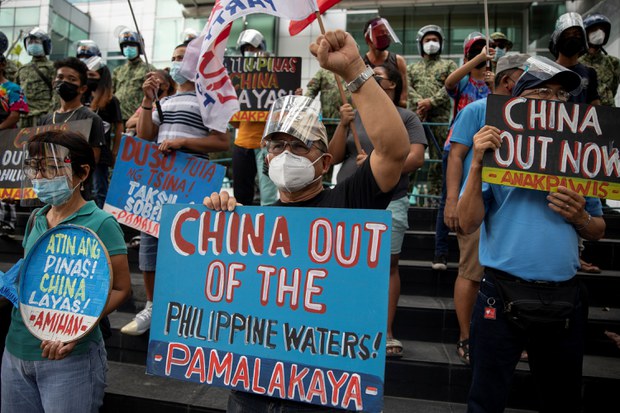Philippines Steps up Diplomatic Protests to Beijing over South China Sea
2021.10.22
 Activists stage a protest outside the Chinese Consulate, guarded by Philippine police, on the fifth anniversary of an international arbitral court ruling invalidating Beijing’s historical claims over the waters of the South China Sea, in Makati City, Philippines, July 12, 2021.
Activists stage a protest outside the Chinese Consulate, guarded by Philippine police, on the fifth anniversary of an international arbitral court ruling invalidating Beijing’s historical claims over the waters of the South China Sea, in Makati City, Philippines, July 12, 2021.
More than 70 percent of diplomatic protests by the Philippines government against Chinese activities in the South China Sea in the last five years were filed this year alone, the nation’s foreign ministry says, hinting at a tougher stance in Manila’s dealings with China.
A total of 153 out of the 211 notes verbales, or diplomatic notes, were filed in 2021 alone, the state-run Philippine News Agency quoted Department of Foreign Affairs Assistant Secretary Eduardo Meñez as saying on Thursday. China has responded to all but two communications, Meñez added.
In addition, the DFA said on Wednesday it had protested the “issuance of over 200 radio challenges, sounding of sirens, and blowing of horns by Chinese government vessels against Philippine authorities” patrolling in the South China Sea. It is unclear when these incidents took place.
While the hundreds of diplomatic notes against China might be seen as public posturing, it also shows that the government “has become more open in their intention of how to deal with Beijing,” according to Jay Batongbacal, director of the Institute for Maritime Affairs and Law of the Sea at the University of the Philippines.
“It may also indicate a shift in President Duterte’s approach, that he has become less involved in managing this aspect [maritime disputes] of Philippine-China relations and is leaving it to relevant departments,” Batongbacal said.
“And so the DFA has got back to what they’re supposed to do: filing protests when necessary,” he told BenarNews.
President Rodrigo Duterte, whose term ends next year, took office in 2016, just two weeks before Manila won a landmark case against China’s expansive claims in the South China Sea at the Permanent Court of Arbitration in The Hague. The tribunal found that Beijing’s “historical claims,” as demarcated by the so-called nine-dash line that straddles the South China Sea, have no legal basis.
The president, however, did not press the tribunal victory, as he pursued a rapprochement with Beijing in exchange for economic benefits like loans and investments, most of which have yet to materialize.
‘Mild effect’
One of the earliest diplomatic protests lodged by the Philippines this year was in March when hundreds of Chinese vessels were sighted mooring at Whitsun Reef in the Spratly Islands. The Philippines says the reef, which it calls Julian Felipe, lies entirely within its exclusive economic zone (EEZ) but Vietnam and China also hold separate claims.
Whitsun Reef is located 175 nautical miles west Palawan Island in the Philippines and 638 nautical miles from China’s Hainan Island.
The Philippine military alleged that the Chinese ships belonged to its increasingly powerful maritime militia but Beijing denied the accusation, saying they were fishing boats taking shelter from bad weather.
As the Whitsun Reef incident escalated, Manila summoned Chinese Ambassador Huang Xilian to demand that China withdraw ita vessels. Before that, the DFA also filed another diplomatic protest and Foreign Secretary Teodoro Locsin Jr. threatened to do so daily “till the last one’s gone like it should be by now if it is really fishing.”
The number of Chinese ships at Whitsun dwindled to single digits by mid-May but increased again by mid-June. By then, the Philippines had filed 100 diplomatic protests since June 2016 against China’s various incursions, including in the waters off Pag-asa, also known as Thitu Island.
The diplomatic protests do have a mild effect, Batongbacal said. He noted that incursions by Chinese fishing vessels into Philippine waters this year are markedly less than in previous years.
“But the territorial disputes in the South China Sea are much larger, more complex and involve multiple players, thus require more coordinated actions than notes verbales,” he added.
Coordination among Southeast Asian nations, even those with overlapping claims with China in the South China Sea, is rarely straightforward.
While Malaysia and Indonesia expressed concern about the announcement of a trilateral security pact between the U.S., U.K. and Australia (AUKUS) last month, the Philippines welcomed it. AUKUS, which will help Australia acquire nuclear-powered submarines, is widely viewed as a pushback against China’s growing military power in the Indo-Pacific.
Even within the administration of a single government, such as the Philippines, there can be conflicting messages.
A week after Locsin hailed the pact as helpful in addressing a “military imbalance” in favor of China, Duterte expressed concerns that the pact could provoke a “nuclear arms race.”
Jason Gutierrez in Manila contributed to this report.







